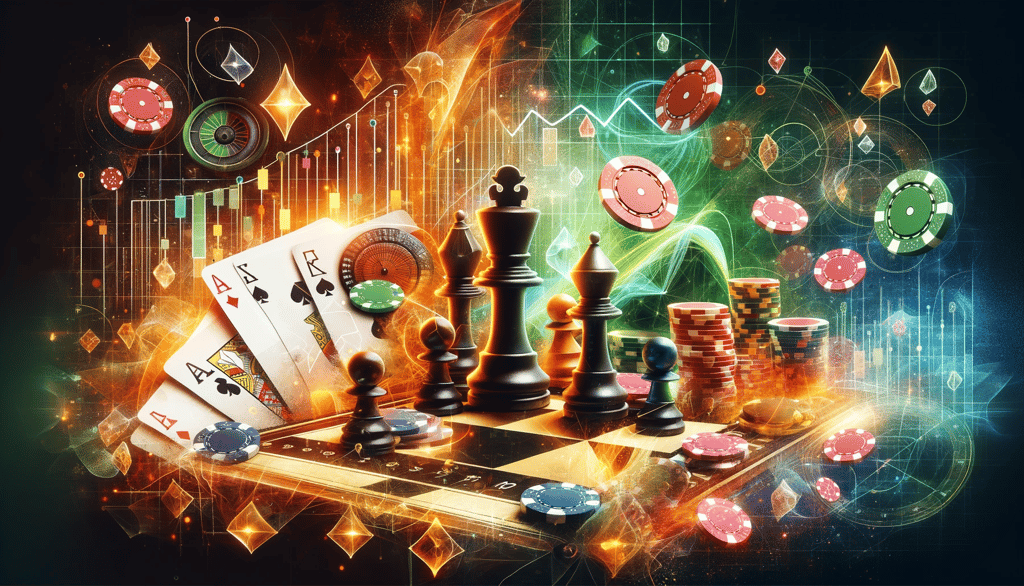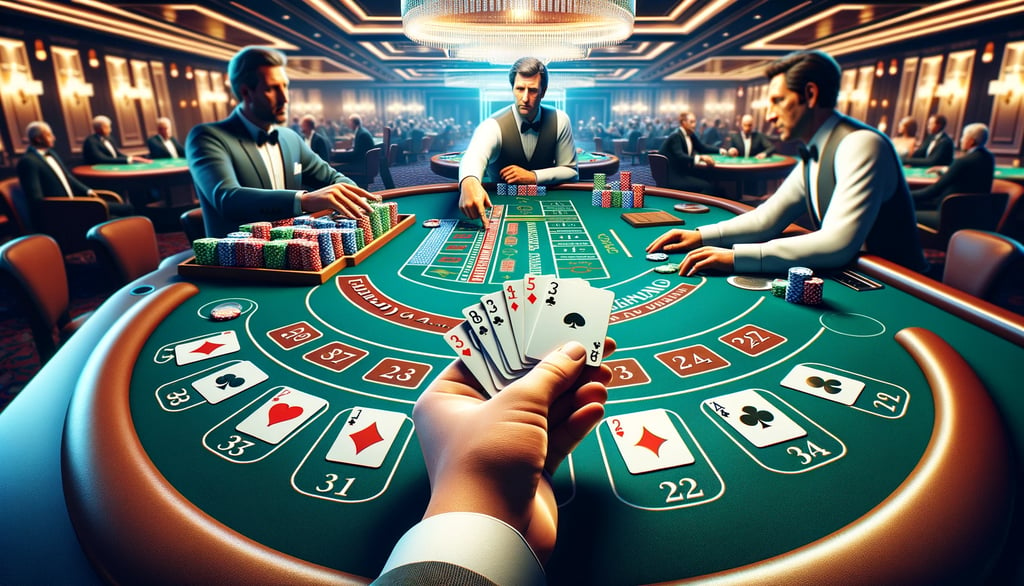Game Theory: The Intriguing Link to Online Casinos and Sports Betting
GENERAL
C. William
4/13/202410 min read
In the intricate world of online gambling, success often hinges not just on luck but on the strategic use of game theory. Whether you're Googling "casinos near me" or engaging in high-stakes online casino real money games, understanding and applying game theory can significantly enhance your gaming strategy.
This comprehensive guide delves deeper into how game theory intertwines with various forms of gambling such as real money slots, poker, and sports betting, offering a fascinating glimpse into the art of strategic betting.
Introduction to Game Theory
Game theory is an interdisciplinary field that utilizes mathematical models to analyze interactions involving strategies among rational decision-makers. Developed first for economics and political science, it has been adapted to address a wide range of real-world issues, including ecology, computer science, and online gambling. In environments like digital casinos, game theory proves invaluable in helping players navigate complex decision matrices to optimize their potential outcomes.
Basics of Game Theory
At its core, game theory focuses on the strategies that players choose in situations where the outcome depends critically on the actions of other participants (often called "players" in the model). Each player must consider the potential choices of others when planning their own moves, which introduces a significant layer of complexity to decision-making processes.
Rational Decision-Makers
In game theory, players are assumed to be rational, meaning they aim to maximize their own benefits or payoffs. Rationality in this context does not imply that all players are coldly logical or unemotional, but rather that they consistently aim to choose the strategies that yield the highest benefits according to their own valuation.
Strategic Interactions
The strategic interactions analyzed in game theory can range from cooperative scenarios, where players might share resources and align strategies, to competitive settings, such as in online poker games, where one player’s gain directly corresponds to another’s loss. The focus is on understanding how these interactions influence behavior and decision-making.
Game Theory and Online Casino Games
Application in Online Gambling
In the realm of online gambling, game theory's role is to help players make the most informed decisions possible in games of chance and skill. This can include anything from deciding when to hit or stand in blackjack based on probability distributions, to complex bluffing strategies in poker.
Maximizing Outcomes
Game theory aids gamblers by providing a framework to evaluate the potential outcomes of different decisions. It takes into account the predicted behavior of other players, which is especially important in games where players compete against each other directly, like poker.
For instance, by using game theory, a poker player can determine the best times to bluff, fold, or call. This decision is based on the probabilities of possible outcomes and the observed actions of opponents. The player assesses what others are likely to do in reaction to their own choices and selects the strategy that maximizes their expected payoff.
Predicting Behaviors
One of the most critical uses of game theory in gambling involves predicting the behavior of opponents. By understanding how opponents are likely to react to various actions, a player can craft strategies that exploit weaknesses in opponents' approaches. This might mean adopting a more aggressive approach when competitors are cautious or vice versa.
Real Money Slots and Table Games
When playing slots, game theory might not seem immediately applicable since slots are largely based on luck. However, understanding the underlying mechanics like the Return to Player (RTP) and the volatility can guide players in choosing which slots to play and how to manage their bankrolls.
Poker and blackjack are perfect examples of how game theory can be directly applied. In poker, concepts such as the Nash Equilibrium can guide players in making optimal moves considering the likely strategies of their opponents. Players might decide when to fold, call, or raise based on a complex interplay of psychology, probability, and game theory tactics.
Applying Game Theory to Roulette and Blackjack
Blackjack Strategies
Blackjack, often known as the ultimate game of strategy and probability, provides a fertile ground for the application of game theory. Unlike games purely based on chance, blackjack allows players to make informed decisions based on their cards and the dealer’s visible card. Game theory enhances these decisions by optimizing player actions to maximize potential returns.
Strategic Decisions Based on Dealer’s Card
In blackjack, the dealer’s visible card significantly influences players' strategy. Game theory uses this information to calculate the most statistically advantageous move. For instance, if the dealer shows a weak card (4, 5, or 6), the theory suggests players should stand more often, taking fewer risks as the dealer is more likely to bust.
On the other hand, if the dealer’s card is strong (7, 8, 9, 10, or an Ace), players might take more risks by hitting, to strive for a higher total that could beat the dealer’s likely high score.
Optimizing Betting Decisions: Doubling Down and Splitting
Game theory also critically informs decisions on when to double down or split pairs—two of the most potent tools in a blackjack player’s arsenal for maximizing winnings:
Doubling Down: This is advisable when the total of the player’s cards presents a statistically favorable chance of winning against probable dealer totals. For example, game theory models might suggest that players double down on an 11 because a 10, being the most plentiful card in the deck, gives a strong final total of 21.
Splitting Pairs: Splitting is often recommended when players have a pair of cards with the same denomination. Strategic splitting guided by game theory can turn a weak position into a potentially winning one. For example, splitting aces gives a player two chances to hit 21, while splitting 8s changes potentially weak 16 into two separate hands, each starting with a promising 8.
Game Theory in Roulette
While roulette is largely perceived as a game of luck, game theory can still provide insights into betting strategies that might reduce losses and optimize wins. The theory may not affect the outcome of a spin, but it can help in managing bets more effectively.
Betting Strategies
Managing Bets: Game theory might suggest adjusting bet sizes based on the outcomes of previous spins, though it’s important to remember that each spin is independent. Strategies like the Martingale system—doubling bets after losses—are based on game theory, aiming to recoup past losses with a single win.
Bet Placement: Strategic bet placement involves spreading bets to cover multiple outcomes that could potentially minimize risk. For example, placing bets on a combination of high/low, red/black, and even/odd numbers can offer a more balanced risk-reward ratio, guided by probabilistic calculations.
Utilizing Game Theory in Sports Betting
Sports betting provides a ripe platform for applying game theory. Bettors can analyze teams' strategies and past performances to make educated guesses about future games. The use of statistical models to predict game outcomes involves a deep dive into game theory, focusing on maximizing the expected value of each bet. By employing concepts like Nash Equilibria and Bayesian updates, bettors can refine their predictions based on the evolving information during a sports season or even within a single game.
Refining Predictive Models
Game theory helps in developing complex models that account for various factors such as player performance metrics, team dynamics, and even psychological aspects like team morale. These models attempt to simulate different scenarios and their probable outcomes to provide bettors with a quantitative basis for their bets.
Strategic Bet Placement
Further, game theory analyzes the optimal strategies for bet placement. It can guide bettors on how much to bet and what kind of bets to place, considering the risk-reward ratio. Strategies might include hedging bets across various outcomes to minimize risk or aggressively pursuing a high payoff scenario when the model shows a high probability of a specific outcome.
Adjusting to Market Conditions
Additionally, game theory provides insights into market dynamics and betting trends. By understanding how other bettors are likely to react to certain information or events, a game-theoretical approach enables bettors to anticipate changes in betting lines and odds. This strategic anticipation allows for wiser bets placed ahead of significant shifts in the market.
By integrating these advanced game theory concepts into sports betting, bettors can enhance their ability to make more informed and potentially profitable betting decisions. This strategic approach transforms betting from a mere game of luck into a more systematic and analytical pursuit.
Efficient Market Hypothesis in Sports Betting
The Efficient Market Hypothesis, often used in finance, also applies to sports betting and suggests that all known information is already incorporated into odds. However, bettors with superior information or analytical models can find value where the general market does not.
Psychological Insights and Game Theory
The psychological aspects of game theory in gambling cannot be overlooked. In poker, for example, bluffing and psychological warfare are critical tactics. Understanding an opponent's mental state and potential decision-making errors can provide a strategic edge.
Advanced Game Theoretical Models
1. The Minimax Approach
In game theory, the Minimax strategy is particularly critical in zero-sum games like poker, where the objective is to minimize the possible loss for a worst-case (maximum loss) scenario. This approach is not just about winning big, but more importantly, about reducing potential losses when the stakes are high and the game is unpredictable. By preparing for the worst-case scenario, players can manage their risks more effectively and maintain control over their game strategy, even in adverse situations.
Application in High-Stakes Games
High-stakes games amplify the importance of the Minimax strategy because the potential for significant loss is much greater. In these scenarios, players must be exceptionally careful with their betting and playing strategies, ensuring that they are always prepared for the possibility that things may not go as planned.
How Minimax Strategy Works
The Minimax strategy involves calculating the possible losses in different scenarios and then choosing the option where the maximum loss is minimized. This means a player will consider all possible outcomes and the strategies of their opponents to determine the worst-case scenario and then act in a way to mitigate this potential loss.
For example, in poker, if a player holds a moderately strong hand, the Minimax strategy would advise against large bets that could lead to significant losses if an opponent holds a slightly stronger hand. Instead, the player would make smaller bets or even check, to keep the pot size manageable and reduce potential losses.
Strategic Benefits of Minimax
Risk Control: It helps players keep their losses under control, which is particularly important in games where large amounts of money are at stake.
Decision-making Support: By considering the worst-case scenarios, players can make more informed decisions about when to bet, fold, or call.
Psychological Advantage: Employing a strategy that mitigates losses can lead to better psychological resilience, as players are less likely to be negatively affected by significant losses.
Critiques and Considerations
While the Minimax strategy is invaluable for managing risks, it is not without its critiques. Some argue that it can make players too cautious, potentially causing them to miss opportunities for larger gains. Furthermore, the strategy requires an accurate assessment of all possible outcomes and opponents’ strategies, which can be highly challenging in practice.
Overall, the Minimax strategy is a fundamental aspect of game theory applied in zero-sum games like poker. It serves as a safeguard against potential losses, enabling players to manage their risks effectively and play with greater strategic depth, particularly in high-stakes environments.
2. Bayesian Equilibrium
Bayesian Equilibrium is a refined concept in game theory, particularly useful in scenarios where players have incomplete information about the others' types (their preferences, goals, strategies available, etc.). This type of equilibrium extends the idea of Nash Equilibrium to games of incomplete information and provides a framework for making rational decisions based on beliefs and uncertainties.
Understanding Bayesian Equilibrium
Bayesian Equilibrium occurs when each player’s strategy maximizes their expected payoff, taking into account their beliefs about the other players’ types and the strategies those players are employing. Each player updates their beliefs based on new information gathered during the game and uses these updated beliefs to adjust their strategies. This dynamic is especially relevant in settings like online poker or financial trading, where not all the variables are known or visible.
How Bayesian Equilibrium Applies
Predicting Opponents’ Moves: In poker, a player might initially have a belief about the aggressiveness of another player. As the game progresses and more actions are observed, the player updates their beliefs and recalculates the best strategy to maximize their own expected payoff, considering the likely actions of their opponent.
Strategy Adjustment: Bayesian Equilibrium allows for strategies to evolve as the game progresses and as more information becomes available. For example, a sports bettor might change their betting strategy based on updated information about a team’s lineup or recent performance.
Practical Example in Gambling
In a blackjack game, consider a situation where a player must decide whether to hit or stand. The decision can be influenced by beliefs about the next card being a high or low value, which are based on the observed cards played earlier in the game (card counting). The Bayesian approach would involve updating these probabilities as each new card is shown and choosing the action (hit or stand) that maximizes the expected value given the updated belief about the deck's composition.
Benefits of Bayesian Equilibrium
Flexibility in Strategy: Unlike static strategies in traditional Nash Equilibria, Bayesian strategies are adaptive and can change in response to new information.
More Informed Decisions: By incorporating new information to update beliefs, players can make more informed decisions that are tailored to the current state of the game.
Handling Uncertainty: It provides a systematic way to deal with uncertainty in games, allowing players to use probabilistic beliefs in their decision-making process.
Challenges and Considerations
Complexity of Calculation: Implementing Bayesian Equilibrium strategies requires calculating probabilities and expected values based on uncertain and incomplete information, which can be mathematically complex.
Dependency on Accurate Information: The effectiveness of a Bayesian strategy heavily depends on the accuracy of the initial beliefs and the quality of information updates. Misjudgments in either can lead to suboptimal decisions.
Bayesian Equilibrium introduces a sophisticated method for dealing with uncertainty in strategic interactions by allowing players to update their strategies based on evolving information about other players' actions and characteristics.
This equilibrium concept enhances the depth and dynamic nature of strategy in games of incomplete information, providing a robust tool for online gamblers and strategists in various fields.
Enhancing Your Gambling Strategy with Game Theory
Game theory is more than just a theoretical concept; it's a practical tool that can be used to enhance your gambling strategies effectively. By applying these principles, you can transform your approach to online gambling from a purely recreational activity to a more calculated and potentially profitable endeavor.
Next time you find yourself searching for "casinos near me" or participating in any online casino real money games, remember that with the strategic edge provided by game theory, you're not just gambling; you're engaging in a complex, intellectual exercise that challenges both your math skills and psychological acuity. This mindful approach to gambling will not only increase your chances of winning but also deepen your appreciation of this fascinating field.
AFFILIATE DISCLOSURE: If you wager at an online casino/sportsbook through one of our links, we may earn an affiliate commission.
DISCLAIMER: Online Wagering is illegal in some Jurisdictions. It is your responsibility to check your local regulations before playing online. Deposit&Play takes no responsibility for your actions.
Depositandplay.com | ©2026 - All Rights Reserved
Must be 21+ years or older to gamble. Gamble Responsibly.












